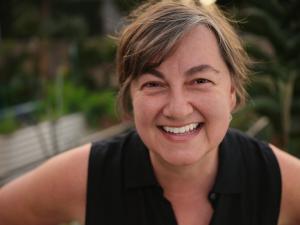
By Munyao Kilolo, Ph.D. student, comparative literature
Jana Remy’s most memorable moment in her studies at UCI was a year before graduation, when she decided to tell her advisor that she would not go onto the academic job market.
“I felt like I had somehow done something disappointing. That I wasn’t doing what I had been training to do,” she says.
She pushed past her hesitation and discomfort, informing Professor of History David Igler, her advisor, that she had chosen another path in the education sector than that of becoming a professor. Today, Remy is the Assistant Vice President of Educational Technology at Chapman University, where she supervises classroom and instructional technology across the campus.
What had been an emotional moment for Remy turned into a point of liberation as her advisor offered unconditional support.
“He recognized that I could enter a career where I could provide for my family while staying intellectually engaged. He acknowledged that working full-time in educational technology, even in an administrative capacity, would still offer me room to thrive. The job opportunity brought about a sense of comfort rather than the discomfort and uncertainties often associated with job hunting. To his credit, the conversation unfolded very well. It was I who was uncertain whether I had made the correct decision,” she explains.
Remy joined UCI in 2004 seeking a Ph.D. in History. As a student who came to doctoral studies later in life, she knew she needed to be practical about her choices. Remy pursued a Ph.D. in History at UCI from 2004 to 2012, a period marked by the global financial crisis. Remy notes that “between 2005 and 2008, the job market was really abysmal. It was this that really got me thinking. For one, I wanted to finish my Ph.D. It was important to me to complete what I started. And I was really enjoying the intellectual journey! However, I recognized that faculty jobs were few and far between. It was becoming less attractive to me to take a job anywhere in the country just to have employment. I had two teenagers at home. I needed to think of what I could do that was academically adjacent, limit the disruption to my family and also financially support them.”
Aware of these challenges, Remy actively created networks that would prove valuable to her career journey. She held conversations frequently about her vision and developed a succinct way of expressing her aspirations. In 2008, at a Christmas party, she met a woman who led the academic technology division at Chapman. A year later, one of the staff members in this woman’s department was going on medical leave, and they called Remy to see if she could temporarily step in. In 2010, Remy started at Chapman as Associate Director of Instructional Technology.
Her current work departs from her training as a historian, though Remy has had a long-standing interest in technology. As early as 1995, she made websites as a side hobby and during the mid-2000s, when Twitter emerged, she embraced it as an early adopter. Remy, now a recognized historian, actively employed Twitter and social media for social commentary. Her tweets often gained recognition in news outlets. While pursuing her graduate studies, she supported faculty members with Electronic Educational Environment Plus, or EEE+, a technology of that era that later transitioned to Canvas. Her assistance extended to helping faculty manage diverse tools and features to create course material, communicate with students and assess performance.
“I had these skills, and they became instrumental to my current role at Chapman. My temporary position went very well, and I was soon offered full-time work in academic technology.”
The job presented its own set of challenges. Nevertheless, Remy is continually aware of the difficulties inherent in the conventional academic path pursued by those opting for academia-based careers. She points out that even for Ph.D. alumni who secure a tenure-track position, the initial 5 to 10 years of their careers can be more demanding than their time in graduate school.

“I have seen that stress really undermines the quality of life of some of my colleagues. As a staff member, I don’t have tenure, but I also enjoy the experience of being able to go back home at 5 p.m. and not working all night imagining my tenure review process. The stress of publishing for junior faculty is so high. They have to establish themselves by consistently publishing high-quality research, meeting the often-difficult criteria for tenure and promotion, teaching and, at the same time, maintaining a healthy work-life balance. I don’t envy it.”
Ultimately, Remy believes that there are many ways to be intellectually engaged. Those alumni who pursue industry or academic-adjacent jobs need not feel that they have disappointed themselves or others. What is important is one’s larger goals. And for Remy the larger goal was twofold: to provide for her family and support student learning.
“There is always a way to be in the scholarly world without necessarily having a tenure track role,” she says, with a smile.
